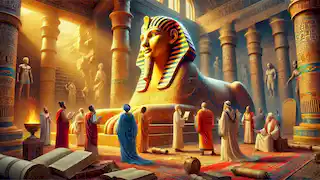The Tale of the Sphinx
Reading Time: 5 min
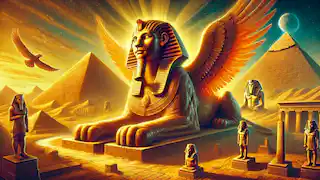
About Story: The Tale of the Sphinx is a Myth from egypt set in the Ancient. This Descriptive tale explores themes of Wisdom and is suitable for All Ages. It offers Cultural insights. An enduring myth of wisdom, riddles, and the divine guardian of two ancient worlds.
The great sands of Egypt whisper ancient secrets of gods, heroes, and mythical beasts. Among these tales is the enigmatic Sphinx—a creature of unmatched mystery and awe. With the body of a lion, the wings of a bird, and the face of a human, it is said to guard secrets that could unravel the fabric of the mortal and divine realms. The story of the Sphinx bridges the worlds of Egypt and Greece, its origins rooted in divine will and its legend crossing seas to inspire fear and reverence. This is the tale of the Sphinx: a journey of creation, power, and eternal riddles. Before the pyramids rose from the Nile's banks, the gods convened in the heavens. Ra, the sun god, gazed down upon Egypt and saw the people’s struggle against invaders and chaos. “They need a protector,” he declared, “a sentinel to guard the sacred lands and strike fear into the hearts of the unrighteous.” Thoth, the god of wisdom, proposed a creature forged from the strongest and most noble of earthly beings. “A lion’s body for courage, a bird’s wings for the reach of the divine, and a human’s intellect to uphold justice,” he proclaimed. Ra agreed and imbued this being with a piece of his celestial light, ensuring its eternal strength. Thus, the Sphinx was born—a divine creation unparalleled in its might and wisdom. It prowled the deserts, safeguarding temples and treasures, leaving no mortal bold enough to challenge its dominion. But its purpose was not solely protection; it was also a keeper of secrets, a test for the wise and foolish alike. In time, the Sphinx became the subject of reverence and fear. Travelers spoke of its golden eyes glowing in the moonlight, its deep voice resonating across the dunes. Yet no one truly understood its purpose until one fateful encounter. A Greek merchant named Philon ventured into Egypt to trade. Ambitious and curious, he sought to learn the ways of this ancient land. During his travels, Philon heard tales of the Sphinx and its infamous riddle: “Answer correctly, and you may pass. Fail, and your life is forfeit.” Philon’s thirst for knowledge led him to the Sphinx’s domain, near a great temple dedicated to Ra. As he approached, the ground trembled, and the Sphinx appeared, its wings casting a shadow that covered the merchant. “What walks on four legs in the morning, two at noon, and three in the evening?” it asked, its voice a low growl filled with menace. Philon, trembling yet determined, pondered the riddle. After moments of intense thought, he replied, “Man. As an infant, he crawls on all fours. As an adult, he walks on two legs. In old age, he uses a cane, walking on three.” For the first time, the Sphinx bowed, allowing Philon to pass. Yet, this encounter marked a turning point in its existence. The riddle, once a divine secret, was now known to mortals, and the Sphinx’s purpose seemed to waver. The fame of the Sphinx spread far and wide, reaching the shores of Greece. Unlike the Egyptians, who revered the Sphinx as a protector, the Greeks saw it as a symbol of terror. Myths arose of a Sphinx perched atop Mount Phicium near Thebes, tormenting travelers with impossible riddles and devouring those who failed to answer. One such tale spoke of Oedipus, a prince seeking to escape a dire prophecy. As he approached Thebes, the Sphinx descended upon him, its eyes gleaming with malice. “Solve my riddle, or perish,” it hissed. But Oedipus, like Philon before him, answered correctly, driving the Sphinx to despair. In Greek myth, it is said the creature leapt from the mountain to its death, unable to bear the defeat. Yet, this is only one version of the story. In Egypt, the Sphinx was never truly defeated. Its spirit endured, a silent guardian watching over the land it was created to protect. Though the Sphinx’s physical form faded into legend, its essence lived on in the cultures it touched. In Egypt, it became a symbol of divine authority, carved into stone as the Great Sphinx of Giza, its enigmatic gaze facing the rising sun. In Greece, it remained a creature of riddles and challenges, a metaphor for humanity’s struggle to confront the unknown. The Sphinx also transcended mythology, inspiring art, literature, and philosophy. Its riddles symbolized the search for truth and the balance between intellect and instinct. Its image, etched into monuments and scrolls, reminded generations of the eternal interplay between the mortal and divine. To this day, the Sphinx remains an icon of mystery. Whether in the sands of Egypt or the tales of Greece, it continues to challenge humanity, asking questions that probe the depths of our knowledge and the limits of our courage. Its riddle echoes through the ages, a testament to the power of wisdom and the enduring allure of the unknown.The Birth of a Guardian
The Riddle of the Nile
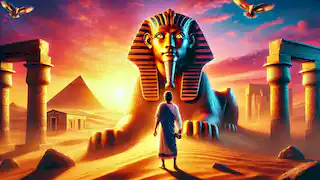
Crossing to Greece
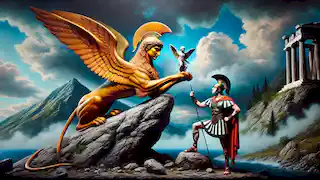
Legacy of the Sphinx
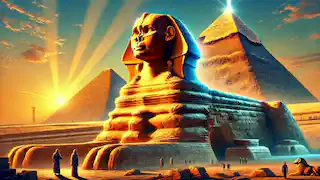
Epilogue: The Eternal Guardian
